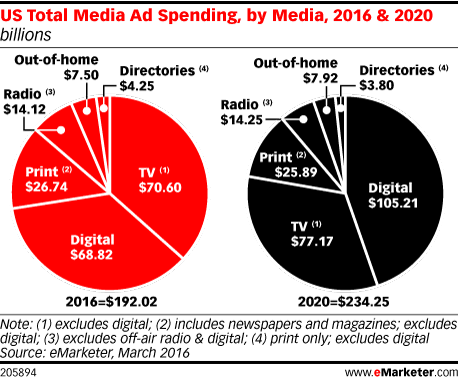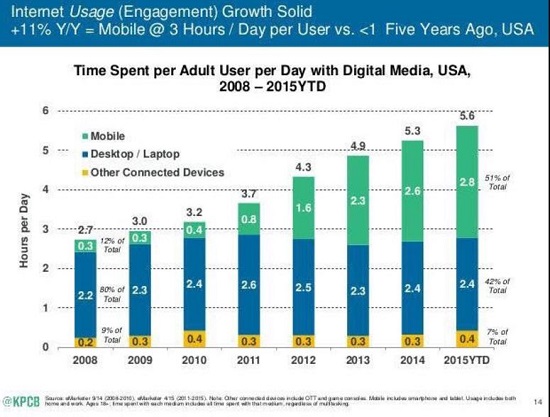Oops, wrong first line.
That's Pride and Prejudice. Here's the right one, from Charles Hugh Smith:
It's an article of widespread faith that data-mining enables advertisers buying online adverts to target consumers with laser-like precision. Vast warehouses of servers grind through billions of records of consumer profiles and transactions and with a bit of algorithmic magic, distill all this data down to the prime target audience for whatever good or service you're selling: probiotic goo, battery-powered back-scratchers, Zombiestra(tm), investment newsletters based on darts tossed by monkeys, etc.
And everybody knows online media is the place every advertiser wants to be and needs to be. By some measures, online advertising exceeded television advert spending in 2016 (around $70 billion each). Unlike traditional media advertising, which is stagnating or declining, online advertising is still expanding smartly--especially in mobile media.
Combine the promise of god-like targeting via data-mining with fast-growing online platforms, and you've got advertisers falling over themselves in their rush to spend billions more on online advertising.

As if that wasn't enough to get advertisers salivating, the time consumers spend online continues to expand as well:

There's one little problem with this narrative: online adverts don't work as well as they're advertised. Proctor and Gamble recently announced that a significant reduction in their online social-media advert spending had no measurable effect on sales.If interested see also:
The only possible conclusion (unless you're selling online adverts for a living) is: online adverts don't work.
There's another little multi-billion-dollar fly in the ointment of online advertising known as click-fraud-- the clicks on adverts may not be humans actually interested in the product being advertised but automated bots skimming money from advertisers or competitors.
So all those clicks aren't from actual consumers; they're bots clicking on click-farm sites which send a small fee for every click to the owner of the site, which just so happens to be the owner of the bots clicking on the adverts.
Or an advertiser finds they owe $100,000 in click-fees for the tens of thousands of clicks their adverts garnered--but most of the clicks were generated by competitors seeking to bleed the advertiser of revenues and introduce false data points....MORE
Restoration Hardware and the Online Advertising Value Proposition
"Google To Refund "Fake Traffic" Advertising Revenue"
"Everything is Changing; So Should Antitrust" (advertising, the media, Goog and FB)
In late July we mentioned P&G in relation to another problem—"Banner blindness":
...No wonder Proctor & Gamble could cut their online ad budget by $100 million last quarter and see no drop-off in sales: the 40% of traffic that isn't bots is basically blind to the ads.
Shhhh, don't tell Facebook or the GOOG, they'd be crushed.